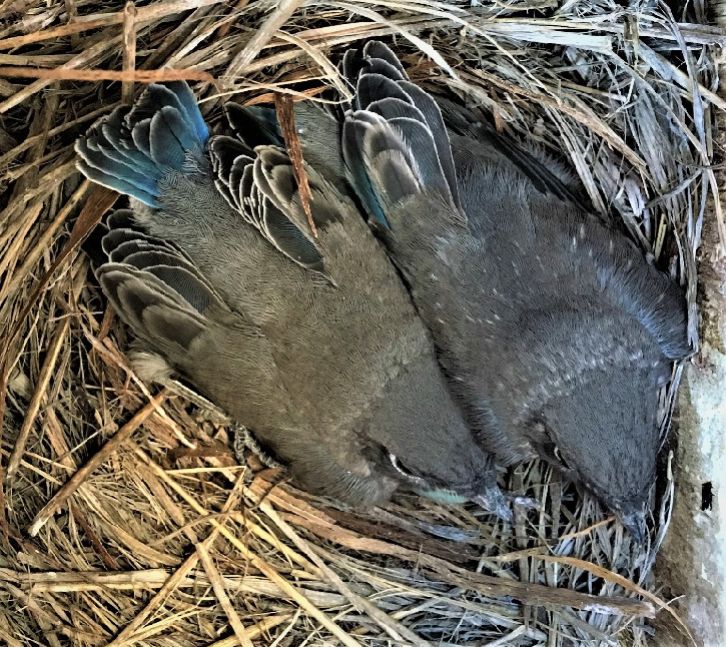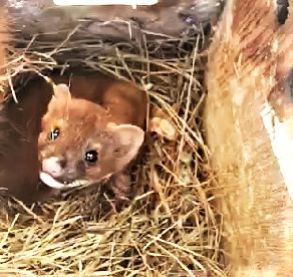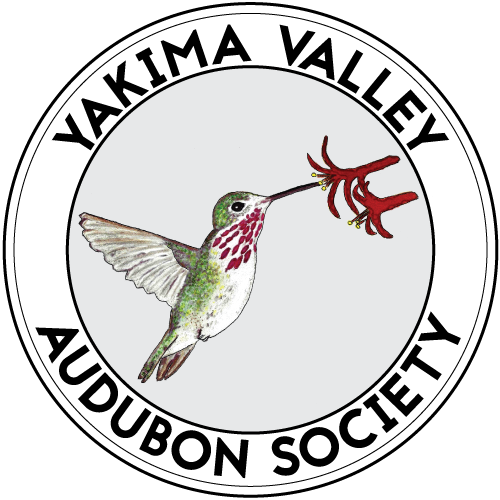Blues News - In 2019, Vredenburgh Trail Survives
General ·In 1982, YVAS members put up 57 nest boxes in the Wenas area. The trail was expanded over the years and now has 132 nest boxes along a 14 mile stretch of North Wenas Road between Audubon Road and Durr Road. In 1994, the trail was named in honor of Virginia and Harold Vredenburgh to recognize their years of tireless devotion to help bluebirds flourish in Yakima County. YVAS members continue to monitor the boxes weekly throughout each breeding season. Sponsorship of individual boxes has been a hallmark of the trail since its inception.

I first monitored one-half of the Vredenburgh Trail in 1998 and was immediately hooked. Every year is different; every year has surprises, disappointments, and similarities. And every year, the weather has an impact.
The winter of 2018-2019 was mild by eastern Washington standards until February hit; then previously dry ground was coated with one snowfall after another with the residual accumulation on April 1st forcing a rare cancellation of our annual cleanout and inspection of the nest boxes.
By Memorial Day weekend when Audubon Campers monitor the boxes, nest box occupancy was high and monitors found that four Mountain Bluebirds had fledged from Box 110; additionally, six Western Bluebirds took wing from Box 123A. At that time, White-breasted Nuthatches occupied three boxes, a total of six nestlings in two and the other housing five eggs. As a side note, the Ryan Trail (now cared for by Pat Kinney) off Highway 410 hosted four early WBNU boxes while the Cleman Mountain Trail (Joe and Karen Zook) had its first ever - a banner year for the nuts.
Also early in the season, a box that contained four eggs the prior week was inhabited by a weasel. Perhaps coincidence, the box immediately below and the box adjacent immediately above this box suffered nestling predation one and two weeks prior to the minute mammal’s discovery.
Overall, despite a promising early season, the trail was plagued by nest failures this year. Last year, I reported a total of 29 nestlings perished on the trail. This year monitors logged a total of 100 nestlings lost. The losses for each of the Trail’s four section of 33 boxes each were: 33, 7, 26, and 34 respectively. The North American Bluebird Society’s quarterly publication stated that bluebird trails across North America were not enjoying the success of most prior years. One suggested possibility was that insect populations are in severe decline with many species that have not become extinct are in danger of doing just that. Bluebirds feed their young almost exclusively insects in the early stages of development but may switch to fruits/berries (such as chokecherries) later in the season as ripening occurs. A continuing shortage of insects will impact many of our avian friends.
Our production for 2019 totaled 352 Western Bluebirds, 94 Mountain Bluebirds, nine White-breasted Nuthatches and a single Tree Swallow. The swallow, also an insectivore species, came from a mid-season clutch of six nestlings.

On the bright side, Mountain Bluebirds registered their highest fledge total since 2001. See pages 7 and 8 in this Crier.
Next year, we hope to incorporate twenty nest boxes on Durr Road into the Vredenburgh Trail. Established years ago by Virginia Vredenburgh and subsequently lovingly tended to by Gus and Mary Pooler, this string has produced Mountain Bluebirds almost exclusively. For example, 2019 recorded fifty Mountains and a single Western.
Just as in life, bluebird trails are filled with ups and downs. Though winter may be a drab season locally for bluebirds, we hope they are flourishing somewhere else on this planet. Come spring, I am sure our anticipation for the return of our friends will breathe fresh enthusiasm for our interaction once more. Perhaps this will be the year that more of you make time to embrace a joy that cannot be purchased.
— Richard Repp
